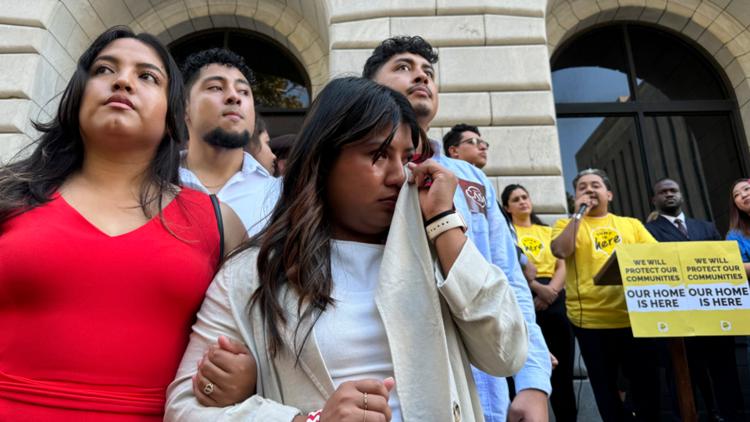NEW ORLEANS — Immigrants who built lives in the United States after being brought here illegally as children were among more than 200 demonstrators who gathered Thursday outside a federal courthouse in New Orleans, where three appellate judges heard arguments over the Biden administration's policy shielding them from deportation.
At stake in the long legal battle playing out at the 5th U.S. Circuit Court of Appeals is the future of about 535,000 people who have long-established lives in the U.S., even though they don't hold citizenship or legal residency status and they could eventually be deported. The case is likely to wind up at the Supreme Court.
“I live here. I work here. I own a home here,” said María Rocha-Carrillo, 37. She traveled from her home in New York to join the demonstration and was on the front row of a packed courtroom as the hearing started.
She said she was brought to the U.S. at age 3 when family members immigrated from Mexico, where she was born. She could not get a teaching certificate until the Deferred Action for Childhood Arrivals program allowed her to build a career in education.
Opponents of DACA, chiefly Texas and eight other Republican-led states, have said in court arguments and legal briefs that hundreds of millions of dollars in health care, education and other costs fall on states when immigrants are allowed to remain in the country illegally.
A key element of the arguments before the appeals panel is whether lead plaintiff Texas has shown that it has standing to bring a lawsuit and whether a lower court judge in Texas had authority to issue a nationwide ruling.
DACA supporters argued that Texas hasn’t shown that the costs it cites are traceable to the policy and, thus, hasn't shown that it has standing. Judge Stephen Higginson, questioning Joseph Mazzara of the Texas Attorney General’s Office, noted that 22 states have said they benefit from the contributions of DACA recipients, who are known as “Dreamers."
“How could a single judge tell all 22 other states who are so grateful for these people that actually they’ve all got to leave the United States?” Higginson asked. “How does a single judge have that authority?”
However, Judge Jerry Smith said he was doubtful that Texas lacks legal standing,
“I don’t understand how you get anywhere with that argument,” Smith told Brian Boynton, who was arguing for the Biden administration.
An earlier 5th Circuit ruling fought held that Texas did have standing. Boynton said the Supreme Court has since raised the bar for states to prove standing, but Smith said the precedents Boynton cited don’t contain unequivocal language that would require the appeals court to back off its previous finding.
It was unclear when or how the panel — Smith, nominated to the 5th Circuit by former President Ronald Reagan; Edith Brown Clement, nominated by former President George W. Bush; and Higginson, nominated by former President Barack Obama — will rule. The case will almost certainly wind up at the Supreme Court.
Obama first put DACA in place in 2012, citing inaction by Congress on legislation aimed at giving those brought to the U.S. as youngsters a path to legal status and citizenship. Years of litigation followed. President Joe Biden renewed the program in hopes of winning court approval.
Last year, U.S. District Judge Andrew Hanen in Houston said the executive branch had overstepped its authority. Hanen barred the government from approving new applications but left it intact during appeals for those who had already been approved for deferred status. Boynton asked the 5th Circuit judges to keep that policy while appeals continue if they rule against DACA.
Outside the court building Thursday, Wendy Reynoso, 24, said she was brought to the U.S. by her family from Guatemala when she was a toddler. She said her DACA application is in limbo while the litigation continues, leaving her unable to find work as a mechanical engineer after college.
“It hurts because even though I graduated with such a good degree, I’m not able to use it. So, I’m just stuck” she said.
Defenders of the policy argue that Congress has given the executive branch's Department of Homeland Security authority to set immigration policy.
The states that joined Texas in challenging DACA are Alabama, Arkansas, Louisiana, Nebraska, South Carolina, West Virginia, Kansas and Mississippi.
Among those states' allies in court briefs is the Immigration Reform Law Institute. “Congress has repeatedly refused to legalize DACA recipients, and no administration can take that step in its place," the group's executive director, Dale L. Wilcox, said in a statement this year.



